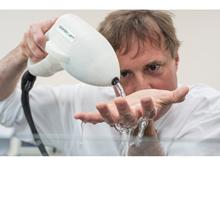Major honour for Professor Tim Leighton
Tim Leighton, Professor of Ultrasonics and Underwater Acoustics at the University of Southampton’s Institute of Sound and Vibration Research, has been elected to a Fellowship of the Royal Academy of Engineering. He is also Associate Dean (Research) in Southampton’s Faculty of Engineering and the Environment.
"I am honoured and delighted to receive this honour," he says. "This reflects the excellent support for Engineering (across two Faculties) at Southampton, which hosts the largest number of Engineering Academics of any UK University. Our vigorous research activity is matched by a thriving enterprise culture to transfer that research into industry, healthcare, Government policy etc."
The Royal Academy of Engineering is the UK National Academy of Engineering, bringing together the UK's most distinguished and prestigious engineers, interfacing with and advising Government, industry, and academia.
In his career, Tim has succeeded in asking unorthodox questions and following them through to real engineering impact. In the latest example, the Royal Society has placed a video interview called ‘Do dolphins think nonlinearly' based on a recent academic paper on its website. This unusual question has led to the development of a sonar system which a major UK manufacturer has stated as being ‘a top priority'. This, like many of his projects, was undertaken in collaboration with Tim's friend and colleague Professor Paul White of ISVR.
Tim's work on extraterrestrial sound led to a device, licensed to planetarium, which simulates the sounds of other worlds and allows planetarium presenters to speak with the voice they would have on Venus (were they to survive), when they tell the audience about the planet.
In 2011 he shared the £250,000 Royal Society Brian Mercer Award for Innovation with his friend and colleague Dr Peter Birkin of Chemistry, for ultrasonic cleaning technology which is now licensed to several users and manufacturers in the UK and abroad. Several hundred patients have now benefitted from use of a kidney stone sensor which he (as Principal Investigator) developed in collaboration with Guys and St Thomas' Health Trust and Precision Acoustics Ltd. The device won the 'Medical & Healthcare' award by 'The Engineer' (founded 1856).
In other work, almost every child born in the developed world in the last ten years has been scanned under guidelines written by a committee on which he served. His discoveries on whale song are part of the standard repartee of whale tour guides in the USA. Tim's research improved the Ministry of Defence's ability to predict sonar performance in coastal waters such as the Persian Gulf. He developed sensors for the $1.3 billion neutron spallation source at Oak Ridge National Laboratories in the USA. His work on conical bubble collapse led to the development of needle free injection systems of which over a million have been sold, primarily for the migraine drug Sumatriptan which has a current global market of over $1 billion per year.
Tim believes engineering excellence is key to UK success: "The country needs engineering innovation, rigorously tested and followed through to impact. It is an inescapable fact that on average this process takes ten, twenty or even thirty years (depending on the discipline). That is a long time to keep an idea progressing and to protect intellectual property rights; it is usually perceived as unaffordable unless the winners are accurately identified so that investment is focused on them. The almost impossibility of picking winners has been replaced by criteria based on guarantees of impact in three to five years, which results mostly in restricting sponsorship to safe research that will produce incremental changes to the problems we should have solved ten years ago. We must also strongly support the broader research base that will give us the solutions to the problems we will face in forty years time, that have not even been identified yet."
Tim's work is multidisciplinary - the citation of the Institute of Physics' 2005 Paterson Medal describes him as being ‘an acknowledged world leader in four fields'. Other honours he has won are: the A B Wood Medal (1994), the Tyndall Medal (2001), and the RWB Stephens Medal (2009) of the Institute of Acoustics. Twice he has been the first recipient of a new international award: the inaugural Early Career Medal and Award of the International Commission for Acoustics in 2004; and in 2001 he was the inaugural recipient of the international Medwin Prize for Acoustical Oceanography, awarded by the Acoustical Society of America. He is a Chartered Physicist, a Chartered Engineer, and has Fellowships of the Acoustical Society of America, the Institute of Acoustics, and the Institute of Physics.
